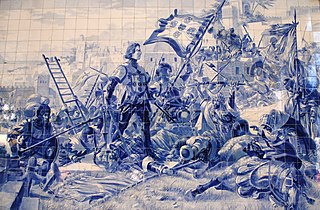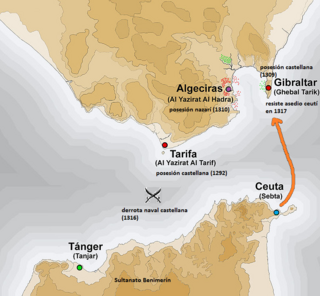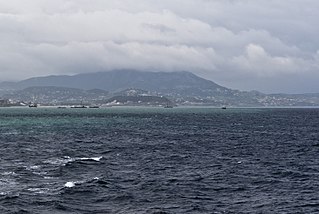
Year 1309 (MCCCIX) was a common year starting on Wednesday of the Julian calendar.

The Portuguese conquest of Ceuta took place on 21 August 1415, involving the forces under the command of King John I of Portugal and the Marinid sultanate of Morocco. The city fell under Portuguese control after a carefully prepared attack, and the successful capture of the city marked the beginning of the Portuguese Empire.

The Battle of Río Salado also known as the Battle of Tarifa was a battle of the armies of King Afonso IV of Portugal and King Alfonso XI of Castile against those of Sultan Abu al-Hasan 'Ali of the Marinid dynasty and Yusuf I of Granada.

Abu Al-Hasan 'Ali ibn 'Othman, was a sultan of the Marinid dynasty who reigned in Morocco between 1331 and 1348. In 1333 he captured Gibraltar from the Castilians, although a later attempt to take Tarifa in 1339 ended in fiasco. In North Africa he extended his rule over Tlemcen and Hafsid Ifriqiya, which together covered the north of what is now Algeria and Tunisia. Under him the Marinid realms in the Maghreb briefly covered an area that rivalled that of the preceding Almohad Caliphate. However, he was forced to retreat due to a revolt of the Arab tribes, was shipwrecked, and lost many of his supporters. His son Abu Inan Faris seized power in Fez. Abu Al-Hasan died in exile in the High Atlas mountains.
Nasr, full name Abu al-Juyush Nasr ibn Muhammad, was the fourth Nasrid ruler of the Emirate of Granada from 14 March 1309 until his abdication on 8 February 1314. He was the son of Muhammad II al-Faqih and Shams al-Duha. He ascended the throne after his brother Muhammad III was dethroned in a palace revolution. At the time of his accession, Granada faced a three-front war against Castile, Aragon and the Marinid Sultanate, triggered by his predecessor's foreign policy. He made peace with the Marinids in September 1309, ceding to them the African port of Ceuta, which had already been captured, as well as Algeciras and Ronda in Europe. Granada lost Gibraltar to a Castilian siege in September, but successfully defended Algeciras until it was given to the Marinids, who continued its defense until the siege was abandoned in January 1310. James II of Aragon sued for peace after Granadan defenders defeated the Aragonese siege of Almería in December 1309, withdrawing his forces and leaving the Emirate's territories by January. In the ensuing treaty, Nasr agreed to pay tributes and indemnities to Ferdinand IV of Castile and yield some border towns in exchange for seven years of peace.
Abu Thabit 'Amir ibn Yusuf was a Marinid ruler of Morocco for around a year. Son or grandson of Abu Yaqub Yusuf, whom he succeeded in 1307.

Abu Yaqub Yusuf an-Nasr was a Marinid ruler of Morocco. He was the son of Abu Yusuf Ya'qub, whom he succeeded in 1286. His mother was a sharifa, Lalla Oum'el'Iz bint Mohammed al-Alaoui. He was assassinated in 1307.
Abu Zakariya Yahya ibn Ziyan al-Wattasi (abū zakarīyā' yaḥyā ben ziyān al-waṭṭāsī Arabic: أبو زكرياء يحيى بن زيان الوطاس was a vizier of the Marinid sultan of Fez, regent and effective strongman ruler of Morocco from 1420 until 1448. He is the founder of the Wattasid dynasty of viziers and later sultans, and as such often designated as Yahya I in Wattasid lists. He was also known by his nickname Lazeraque, as found in Portuguese chronicles.

Pedro de Menezes Portocarrero, was a 15th-century Portuguese nobleman and military figure. Pedro de Menezes was the 2nd Count of Viana do Alentejo, 1st. Count of Vila Real and the first Portuguese governor of Ceuta.

Dom Fernando de Noronha was a 15th-century Castilian-Portuguese nobleman. He was the 2nd Count of Vila Real, a title which he acquired and shared by his marriage to Brites de Menezes, 2nd Countess of Vila Real and the third Portuguese governor of Ceuta from 1437.

Dom Duarte de Menezes, was a 15th-century Portuguese nobleman and military figure. Duarte de Menezes was the 3rd Count of Viana do Alentejo, 2nd Count of Viana, Lord of Caminha and the first Portuguese captain of Alcácer-Ceguer.
Fernando de Castro was a 15th-century Portuguese nobleman, diplomat and military figure. Fernando de Castro was the 1st Lord of Paúl de Boquilobo. He was a member of the royal council of John I of Portugal, and governor of the household of Prince Henry the Navigator.
The battle of Tangier, sometimes referred to as the siege of Tangiers and, by the Portuguese, as the disaster of Tangier, refers to the attempt by a Portuguese expeditionary force to seize the Moroccan citadel of Tangier and its defeat by the armies of the Marinid Sultanate, in 1437.

The second siege of Gibraltar was an abortive attempt in 1316 by the forces of the Azafid Ceuta and the Nasrid Emirate of Granada to recapture Gibraltar, which had fallen to the forces of Ferdinand IV of Castile in 1309.

Abu Said Uthman III, was Marinid ruler of Morocco from 19 March 1398 to 1420, the last effective ruler of that dynasty. He ascended to the throne at the age of sixteen. He succeeded his brother, Abu Amir Abdallah ibn Ahmad. His forces were involved in an unsuccessful attempt to acquire Gibraltar from the Emirate of Granada in 1410. In 1415 the Portuguese seized the port of Ceuta. Abu Said Uthman III failed in an attempt to recover Ceuta, and was shortly after assassinated. His vizier gained control of the kingdom, establishing the Wattasid dynasty of rulers of Morocco.

The sieges of Ceuta, also known as the thirty-year siege, were a series of blockades by Moroccan forces of the Spanish-held city of Ceuta on the North African coast. The first siege began on 23 October 1694 and finished in 1720 when reinforcements arrived. During the 26 years of the first siege, the city underwent changes leading to the loss of its Portuguese character. While most of the military operations took place around the city walls, there were also small-scale penetrations by Spanish forces at various points on the Moroccan coast, and the seizure of shipping in the Strait of Gibraltar. The city was placed under a second siege in 1721 until 22 April 1727. The engagements are considered to be the longest siege in history.

Portuguese Tangier covers the period of Portuguese rule over Tangier, today a city in Morocco. The territory was ruled by the Kingdom of Portugal from 1471 to 1661.
The Battle of the Strait was a military conflict contesting the ports in the Straits of Gibraltar taking place in the late thirteenth century and the first half of the fourteenth. The conflict involves principally the Spanish Muslim Emirate of Granada, the Spanish Christian Crown of Castile and the North African Muslim Marinid state. The ports' strategic value came from their position linking Spain and North Africa, thus connecting Muslims in Spain with the rest of the Islamic world. The campaign had mixed results. Castile gained Tarifa permanently, and managed to take Gibraltar and Algeciras but both would revert to Muslim rule. Castile also failed to gain any port in the African side of the strait.
The siege of Tlemcen from 1299 to 1307 designates all of the operations undertaken by the army of the Marinid sultan, Abu Yaqub Yusuf an-Nasr to seize the city of Tlemcen, the capital of the Zayyanid Kingdom, during the conflict between the Kingdom of Tlemcen and the Marinids. The siege was lifted following the assassination of the Marinid Sultan.

The Portuguese conquest of Ksar es-Seghir in modern Morocco from the Marinid dynasty took place between 23 and 24 October 1458 by Portuguese forces under the command of King Afonso V, surnamed the African.













